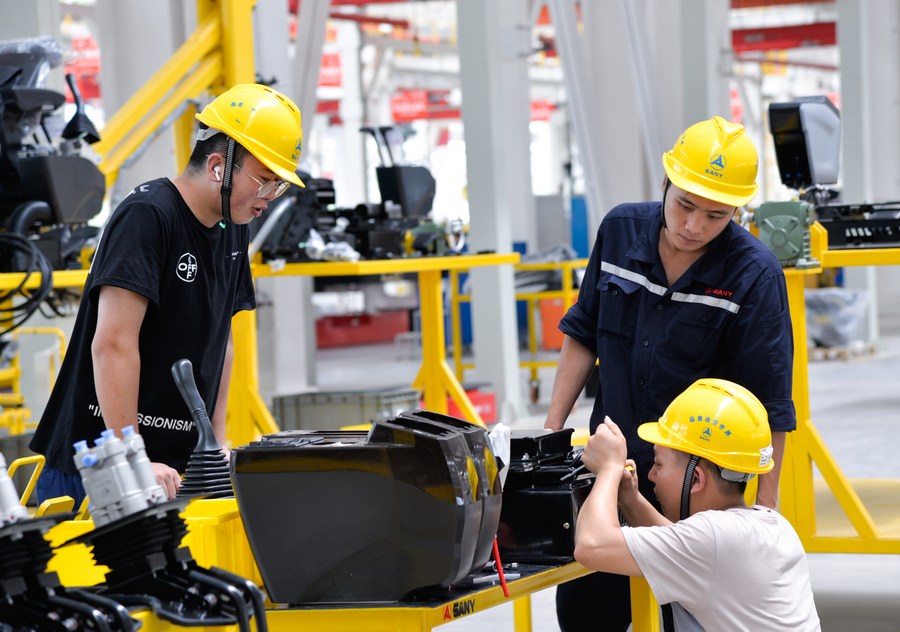China's local governments double down on innovation to drive growth
 0 Comment(s)
0 Comment(s) Print
Print E-mail Xinhua, February 18, 2022
E-mail Xinhua, February 18, 2022

Not long after metaverse became a buzzword in the tech world, generating hopes that it may unlock new potentials of the internet, the term has made its way into the industry policies of China's local governments.
As part of their economic planning for 2022, local decision-makers have vowed to further develop future industries, from metaverse and blockchain to artificial intelligence (AI) and extended reality, a move reflective of their growing desire to look to innovation as a key driver of growth.
New economic milestones
Over the past weeks, China's provincial-level regions held their annual legislative and political consultative meetings, known as "two sessions." Economic data from the meetings showed that various parts of China continued to recover steadily from the impact of the COVID-19 epidemic.
The gross domestic product (GDP) of Hubei Province reached 5 trillion yuan (about 789 billion U.S. dollars) last year, a new height for the province once hard hit by the epidemic.
Calling 2021 "extraordinary and challenging," Wang Zhonglin, governor of Hubei, said it was a year full of achievements in post-pandemic recovery.
With the GDP of Dongguan, a city in south China's Guangdong Province, surpassing one trillion yuan, Guangdong now has four cities in the "one trillion yuan club." The GDP of the province itself exceeded 12 trillion yuan for the first time, leading all provincial-level regions.
In 2021, the GDP of north China's Shanxi Province surpassed two trillion yuan. The traditional energy base also saw a continuing switch to high-tech industries, with the added value of industrial strategic emerging sectors and high-tech manufacturing increasing 19.5 percent and 34.2 percent respectively.
Laying out future industries
High-tech industries have played an increasingly important role in driving growth in various parts of China, with local governments pinning high hopes on the development of new sectors such as AI and quantum information.
Beijing municipal government aims to launch 20 major application scenarios to promote the formation of industrial clusters such as blockchain, artificial intelligence, extended reality and ultra-high-definition display.
Boasting a strong digital economy, Zhejiang Province in east China will promote the development of future industries such as brain-like intelligence and quantum information, and strive to increase the added value of the core industries of the digital economy by 12 percent.
The development of the digital economy is also conducive to upgrading traditional industries. Southwest China's Chongqing Municipality plans to speed up the intelligent transformation of production equipment and key chains, and cultivate 10 new smart factories and 100 digital workshops.
Among many cutting-edge technologies and new concepts, metaverse has become one of the most eye-catching words in the discussions of local lawmakers and political advisors.
"The concept of metaverse can be regarded as the comprehensive development and innovative extension of the digital economy," said Tong Zhilei, a deputy to the Beijing Municipal People's Congress, adding that Beijing should utilize its advantages in resources and talent to get a head start in the area.
Some regions are already on the move. Hefei, capital of east China's Anhui Province, plans to cultivate a group of leading enterprises in frontier industries such as metaverse in the next five years, while Wuhan, capital of Hubei, aims to build a national pilot zone on new-generation AI through the integration of the metaverse, big data, cloud computing and blockchain with the real economy.
Tech-driven real economy
"Within a month, our newly established company had obtained the license to produce medical devices," said Li Li, chairwoman of Masterwork Group Co., Ltd., a high-tech firm based in Tianjin.
From producing printing equipment to medical devices, Masterwork has continued to branch out to new markets through innovation in recent years.
"The efficiency in government approval not only enabled us to meet domestic demand during the pandemic but also helped us export our products in a timely fashion," said Li.
In Tianjin, pro-innovation policies have given rise to a boom in high-tech firms. Last year, 130 enterprises in the northern port city were listed as national-level Small and Medium Enterprises (SMEs) that are specialized and innovative.
Nurturing these "specialized and innovative" SMEs have been high on the agenda of the industrial policies of many local governments.
Shandong Province in east China aims to incubate 400 such SMEs by 2025, while Zhejiang plans to add 100 similar companies in 2022. Some local governments have promised supportive tax and credit policies to these companies.
Liu Xiangdong, a researcher with China Center for International Economic Exchanges, said developing SMEs plays an important role in boosting the competitiveness of the real economy, especially in the manufacturing industry, and helps improve the modernization level and international competitiveness of the industrial and supply chains.
In addition, many local governments have pledged to provide adequate funding for scientific research.
Anhui Province, for instance, has aimed to elevate the share of R&D funding in its GDP to about 2.5 percent in 2022. Guangdong plans to implement a 10-year project to develop basic scientific research, where more than a third of the province's scientific research fund will go to.
"Guangdong will give scientists greater say in choosing research directions and using funds and resources, in an effort to foster greater technological breakthrough," said Chen Hongyu, former vice president of the Party School of the Guangdong Provincial Committee of the Communist Party of China.





